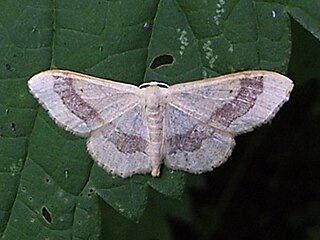
The riband wave is a moth of the family Geometridae. The species was first described by Carl Linnaeus in his 1758 10th edition of Systema Naturae.

Mycalesis oculus, the red-disc bushbrown, is a satyrine butterfly found in southern India. It is similar in markings to Mycalesis adolphei but distinguished by the reddish band around the large apical spots on the upper forewings.
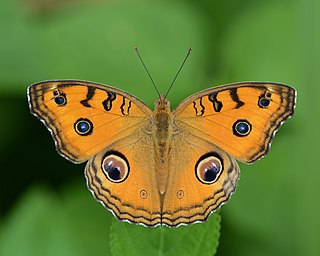
Junonia almana, the peacock pansy, is a species of nymphalid butterfly found in Cambodia and South Asia. It exists in two distinct adult forms, which differ chiefly in the patterns on the underside of the wings; the dry-season form has few markings, while the wet-season form has additional eyespots and lines. It is listed as Least Concern in the IUCN Red List.

Ceretes thais is a moth in the Castniidae family. It is found in Brazil. Superficially it looks very like a butterfly, and was originally placed by Dru Drury in the "Papilio " group which mostly corresponds with modern Nymphalidae.

Mesoxantha is a genus of nymphalid butterflies. It is monotypic, containing only Mesoxantha ethosea, the Drury's delight. It is found in Sierra Leone, Guinea, Liberia, Ivory Coast, Ghana, Togo, Nigeria, Cameroon, Gabon, the Republic of the Congo, the Central African Republic, Angola, the Democratic Republic of the Congo, Sudan, Uganda, Tanzania and Mozambique. The habitat consists of lowland forests, including secondary forests.

Antanartia delius, the forest admiral or orange admiral, is a butterfly in the family Nymphalidae. It is found in Senegal, Sierra Leone, Liberia, Ivory Coast, Ghana, Nigeria, Cameroon, Equatorial Guinea, the Republic of the Congo, Angola, the Democratic Republic of the Congo, Uganda, Kenya, and Tanzania. The habitat consists of lowland forests.

Acraea jodutta, the jodutta acraea, is a butterfly in the family Nymphalidae. It is found in Guinea, Sierra Leone, Liberia, Ivory Coast, Ghana, Togo, Nigeria, Cameroon, Equatorial Guinea, São Tomé and Príncipe, Gabon, the Republic of the Congo, the Central African Republic, Angola, the Democratic Republic of the Congo, Sudan, Uganda, Kenya and Ethiopia.
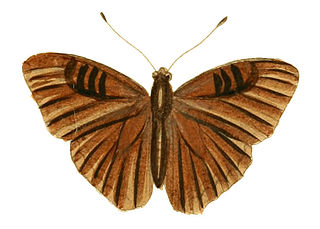
Euriphene doriclea, the Doriclea nymph, is a butterfly in the family Nymphalidae. It is found in Sierra Leone, Liberia, Ivory Coast, Ghana, Nigeria, Cameroon, Gabon, the Central African Republic, the Democratic Republic of the Congo and Uganda. The habitat consists of forests.

Euphaedra eleus, the Eleus orange forester, is a butterfly in the family Nymphalidae. It is found in Guinea, Sierra Leone, Liberia, Ivory Coast, Ghana, Nigeria, Cameroon, Gabon, the Republic of the Congo, Angola, the Democratic Republic of the Congo and Uganda. The habitat consists of primary forests and secondary forests with a closed canopy.

Euphaedra perseis, the Perseis mimic forester, is a butterfly in the family Nymphalidae. It is found in Guinea (Conakry), Sierra Leone, Liberia, Ivory Coast and western Ghana. It was first described by Dru Drury in 1773.

Euphaedra eupalus, the western blue-banded forester, is a butterfly in the family Nymphalidae. It is found in Guinea, Sierra Leone, Liberia, Ivory Coast, Ghana and Togo.
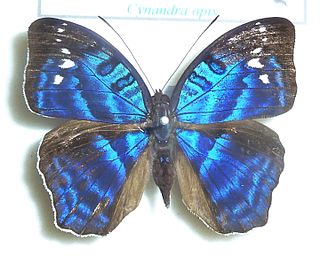
Cynandra opis, the brilliant nymph, is a butterfly in the family Nymphalidae. It is the only species in the monotypic genus Cynandra. It is found in Guinea, Sierra Leone, Liberia, Ivory Coast, Ghana, Togo, Nigeria, Cameroon, Gabon, the Republic of the Congo, the Central African Republic, Angola, the Democratic Republic of the Congo, Uganda and Tanzania. The habitat consists of dense forests.

Pseudacraea hostilia, the western incipient false acraea, is a butterfly in the family Nymphalidae. It is found in Sierra Leone, Liberia, Ivory Coast and western and central Ghana. The habitat consists of wetter forests.
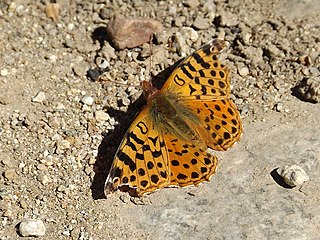
Yramea cytheris is a species of butterfly in the family Nymphalidae. It was first described by Dru Drury in 1773 from the Falkland Islands. In some systems it is included in genus Issoria.

Lucinia cadma is a species of brush-footed butterfly. It was first described by Dru Drury in 1773 from Jamaica. Distinct subspecies are found on other Caribbean islands.
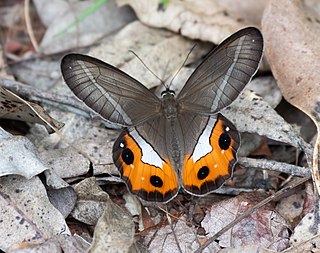
Pierella nereis is a butterfly species from the subfamily Satyrinae in the family Nymphalidae. It was first described by Dru Drury in 1782 from Brazil.

Charaxes distanti is a butterfly in the family Nymphalidae. It was described by Eduard Honrath in 1885. It is found in the Indomalayan realm.

Charaxes nitebis, the green rajah, is a butterfly in the family Nymphalidae. It was described by William Chapman Hewitson in 1859. It is found in the Indomalayan realm.
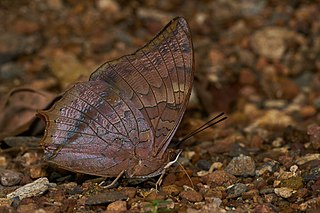
Charaxes psaphon, plain tawny rajah, is a butterfly in the family Nymphalidae. It was described by John Obadiah Westwood in 1847. It is found in the Indomalayan realm.

Charaxes affinis is a butterfly in the family Nymphalidae. It was described by Arthur Gardiner Butler in 1866. It is found in the Indomalayan realm.





















